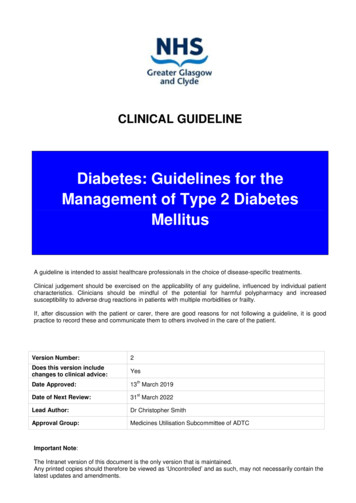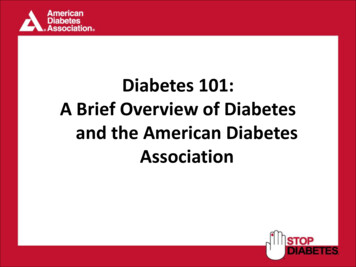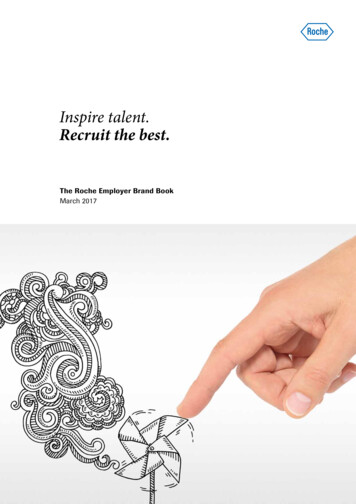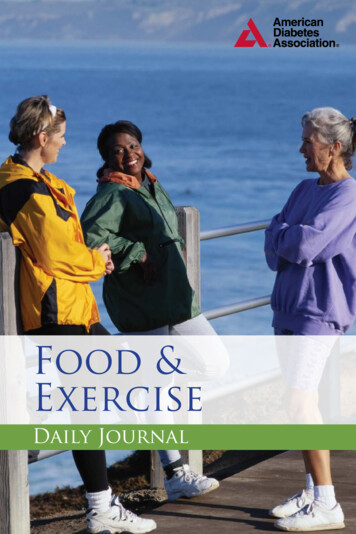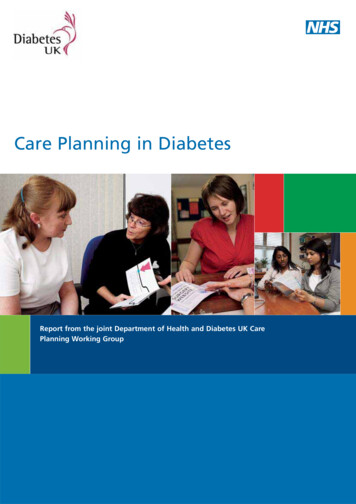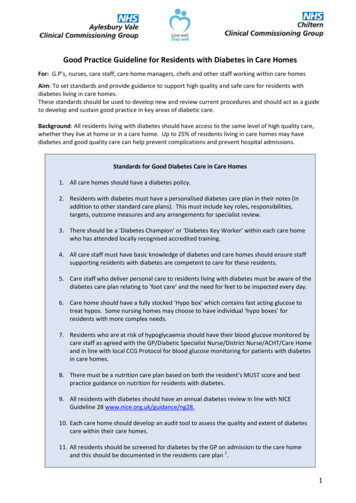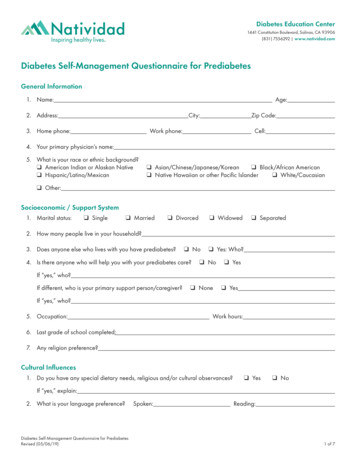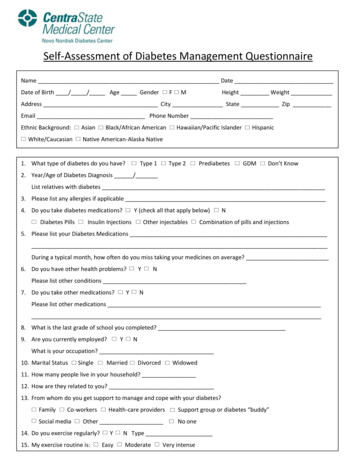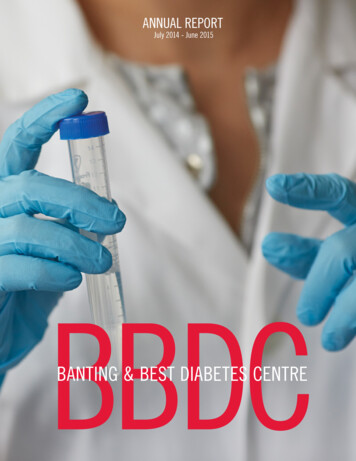
Transcription
ANNUAL REPORTJuly 2014 - June 2015Banting & Best Diabetes Centre
CONTENTS3. Vision and Mission4. Committees6. Director’s Report7. Research Programs and Enabling PlatformsDiscovery Research ProgramsApplied Research ProgramsEnabling PlatformsVision Mission15. Membership16. Finances17. Funding Programs and Funding DecisionsFunding Programs for TraineesAnnual Trainee AwardsCharles Hollenberg Summer Studentship ProgramGraduate StudentshipsPost-doctoral FellowshipsTrainee Travel AwardsFunding Programs for Faculty and Health ProfessionalsArchie Sopman Diabetes Research and Education Awards 2014AstraZeneca Impact Challenge Grant: Cardiovascular/DiabetesBBDC-Novo Nordisk Chair in Incretin BiologyDiabetes Educator of the Year Award 2014Reuben & Helene Dennis Scholar in Diabetes ResearchSun Life Financial Equipment Grants for Diabetes ResearchSun Life Financial Impact Challenge Grant – Diabetes in Developing CountriesSun Life Financial Impact Challenge Grant – Education and Knowledge Translation:Emphasis on the Community PharmacistSun Life Financial New Investigator AwardSun Life Financial Pilot and Feasibility Grants29. Educational Activities1st BBDC-Joslin Diabetes Center Conference: Nutrients, the Digestive Tract and DiabeteAnnual Scientific DayCharles Hollenberg Summer Studentship Program: Weekly Seminar Seriesand Mini-conference 2015Diabetes Update 2015BBDC Seminar Series (in conjunction with City-wide Endocrine Rounds)39. Core Laboratory40. Communications and Publication42. Our Supporters43. AcknowledgementsBanting & Best Diabetes CentreUNI VE RSITY OF TORONTOcover Photo: geoff georgeOUR VISIONAs Canada’s leading centre ofexcellence for innovation in diabetesresearch, education, and clinicalcare, we will tangibly impact diabetesprevention and outcomes in Canadaand globally.OUR MISSIONWe bring together researchersacross multiple University of Torontoaffiliated disciplines to: Develop novel treatment pathsto cure diabetes or prevent itscomplications Identify innovative ways to managediabetes and improve the lives ofthose living with the diseaseThe BBDC was established in1978 as an Extra-Departmental Unitof the Faculty of Medicine, Universityof Toronto with the primary objectiveof advancing diabetes research,education, and care.We currently offer severalstudentships, fellowships, grantsand other support for qualifiedindividuals involved in diabetesresearch, education and care atthe University of Toronto and itsaffiliated institutions. In addition,we host several educational eventsfor researchers and diabeteshealthcare providers.2014-2015 ANNUAL REPORT3
COMMITTEESAPPLIED RESEARCH STEERING COMMITTEE(July 2014 to June 2015)CHAIR: Dr. Gary Lewis, Department of Medicine, Division ofEndocrinology & Metabolism, and Department of Physiology*Dr. Lorraine Lipscombe, Leader, Vulnerable Populations/Population Health ProgramDr. Julia Lowe, Leader, International Diabetes Outreach ProgramDr. Lori MacCallum, Program Director, Knowledge Translation andOptimizing Care Models; Leslie Dan Faculty of Pharmacy*Dr. Rene Wong, Leader, Continuing Health Education and ProfessionalEXECUTIVE COMMITTEEDevelopment Program and CommitteeDIRECTOR AND CHAIR: Dr. Gary Lewis, Department of Medicine, DivisionThis committee is made up of the leadership of the Applied Research Programs. Their purpose is tocoordinate activities in these programs and promote collaboration between the Applied Research andDiscovery Research Programs.of Endocrinology & Metabolism, and Department of Physiology*Dr. Khosrow Adeli, Departments of Biochemistry*, and Laboratory Medicine& Pathobiology*Dr. Alison Buchan, Vice Dean, Research and International Relations, Facultyof Medicine*Dr. George Fantus, Department of Medicine, Division of Endocrinology& Metabolism, and Department of Physiology*; BBDC CoreLaboratory DirectorDr. Richard Gilbert, Department of Medicine, Division of Endocrinology& Metabolism*Dr. Tony Lam, Departments of Medicine and Physiology*Dr. Lorraine Lipscombe, Department of Medicine*, and Department ofHealth Policy, Management and Evaluation*Dr. Julia Lowe, Department of Medicine, Division of Endocrinology& Metabolism*Dr. Bruce Perkins, Department of Medicine, Division of Endocrinology& Metabolism*Dr. Rene Wong, Department of Medicine, Division of Endocrinology& Metabolism*Dr. Minna Woo, Department of Medicine, Division of Endocrinology& Metabolism*TRAINING AND RESEARCH EXCELLENCE COMMITTEECHAIR: Dr. Tony Lam, Associate Director of Research, BBDC; Departmentsof Medicine and Physiology*Dr. Andrew Advani, Department of Medicine, Division of Endocrinology& Metabolism*Dr. Richard Bazinet, Department of Nutritional Sciences*Dr. David Cherney, Department of Medicine, Division of Nephrology*Dr. Carolyn Cummins, Faculty of Pharmacy*Dr. Herbert Gaisano, Departments of Medicine* and Physiology*Dr. Margaret Hahn, Department of Psychiatry*Dr. Cristina Nostro, Department of Physiology*Dr. Jonathan Rocheleau, Institute of Biomaterials and Biomedical Engineering*Dr. Daniel Winer, Department of Laboratory Medicine and Pathobiology*This committee implements the scientific review of BBDC funding programs, develops the AnnualScientific Day program, and selects speakers for the BBDC Seminar Series.The governance structure of the BBDC consists of a Director and Executive Committee who ensure thatthe goals of the Centre are appropriately implemented. The Executive Committee provides leadershipand representation for the University of Toronto diabetes research and care community.CONTINUING HEALTH EDUCATION AND PROFESSIONALDEVELOPMENT COMMITTEECHAIR: Dr. Rene Wong, Department of Medicine, Division of Endocrinology& Metabolism*DISCOVERY RESEARCH STEERING COMMITTEEMrs. Leigh Caplan, Diabetes Educator, Sunnybrook Health Sciences CentreDr. Jeremy Gilbert, Department of Medicine, Division of EndocrinologyThis committee is primarily made up of the leadership of the Discovery Research Programs.Their purpose is to coordinate activities in these programs and promote collaboration between theDiscovery Research and Applied Research Programs.4Banting & Best Diabetes CentrePhoto: istockphoto.comCHAIR: Dr. Gary Lewis, Department of Medicine, Division of Endocrinology& Metabolism, and Department of Physiology*Dr. Khosrow Adeli, Leader, Nutrients, the Digestive Tract and Diabetes ProgramDr. George Fantus, Leader, Prevention and Therapy of DiabeticComplications ProgramDr. Michael Farkouh, Leader, Diabetes and Heart Disease ProgramDr. Denice Feig, Leader, Diabetes in Pregnancy Study GroupDr. Tony Lam, Associate Director of Research, BBDCDr. Michael Wheeler, Leader, Islet/Stem Cell Biology Program“ We aregratefulto ourcommitteememberswhovolunteertheir time toadvance themission ofthe BBDC.”& Metabolism*Mr. Henry Halapy, Diabetes Pharmacist, St. Michael’s HospitalDr. Lori MacCallum, Program Director, Knowledge Translation andOptimizing Care Model; Leslie Dan Faculty of Pharmacy*Ms. Jasmine Montreuil, Registered Dietitian, North York Family Health TeamDr. Phillip Segal, Department of Medicine, Division of Endocrinology& Metabolism*This committee organizes continuing health education in diabetes for the health care team andreviews applications for various BBDC funding programs.* University of TorontoPAST AND PRESENTDIRECTORSDr. Gary F. Lewis(2011 – present)Dr. Daniel J. Drucker(2000-2011)Dr. Bernard Zinman(1993-2000)Dr. Charles H. Hollenberg(1981-1993)Dr. Edward A. Sellers(1978-1981)A personal friend of the co-discovererof insulin, Dr. Charles Best2014-2015 ANNUAL REPORT5
DIRECTOR’SREPORT6Banting & Best Diabetes CentreResearchPrograms EnablingPlatformsWe are grateful that the BBDC hasbeen and will be the beneficiary of asignificant amount of funding:its Guidebook for Pharmacists on DiabetesManagement across the country in bothEnglish and French language versions.The Guidebook provides pharmacistswith a comprehensive and easy-to-useresource for supporting optimal patienteducation and decisions regarding diabetes, further fostering an interdisciplinaryhealth team approach to diabetes care.The program also launched a DiabetesPharmacists Network website as a wayto bring together pharmacists from acrossCanada interested in the care of patientswith diabetes.The BBDC entered into a first-ofits kind partnership with the KangbukSamsung Medical Centre in Seoul,South Korea to help them becomeAsia’s top centre for diabetes treatment, research and education. Fellows from South Korea will travel toToronto to receive hands-on trainingunder the guidance of BBDC’s worldrenowned researchers and will thentake this knowledge back to KangbukSamsung Hospital to help establish anadvanced diabetes program there.A 1M contribution was receivedfrom AstraZeneca. A portion of theinvestment – 750,000 – established theAstraZeneca Impact Challenge Grants,providing grants for research into therelationship between heart disease anddiabetes at the BBDC and the Heartand Stroke/Richard Lewar Centre ofExcellence in Cardiovascular Research. A further 250,000 will supportthe Knowledge Translation and Optimizing Care Models Program whichprovides pharmacists with educationand tools to more effectively supporttheir diabetes patients.The Toronto General and WesternHospital Foundation received a 1Mdonation from an anonymous donorwhich will fund the BBDC’s 1MTransformational Diabetes Team Research Grant program.Sun Life Financial committed 500,000to expand the Pilot and Feasibility Grants,Equipment Grants, and the New Investigator Award programs, as well as to support two new Impact Challenge Grants.Janssen Canada generously provided 50,000 in support of the BBDC’s postdoctoral fellowships program.Gary F. Lewis, MD, FRCPCDirector, Banting & Best Diabetes CentreProfessor, Departments of Medicine and PhysiologyDirector, Division of Endocrinology and MetabolismSun Life Financial Chair in DiabetesDrucker Family Chair in Diabetes ResearchPhoto: istockphoto.comThe BBDC brings together over 100researchers from multiple health andbiomedical disciplines from across theUniversity of Toronto and its affiliatedinstitutions to develop novel treatmentpaths to prevent and manage diabetesand prevent its complications throughexcellence and innovation in research,education and clinical care.The BBDC Strategic Plan (20122016) represented an ambitious leapforward in developing new platformsfor translating discovery into practice by networking across Torontoinstitutions and beyond. All projectsare focused on measurable impact forpatients, care-providers, vulnerablecommunities, policy-makers and healthsystem leaders. Now in the fourth yearsince implementation of the strategic plan, we are pleased to provide aprogress report of BBDC activities.2014/2015 was a very productive yearfor the Centre. Below are some of themajor highlights:The BBDC in collaboration withthe Joslin Diabetes Center held itsfirst annual conference in Torontoon Nutrients, the Digestive Tract andDiabetes. The event brought togetherresearchers of the BBDC, the JoslinDiabetes Center, and other international research organizations to addressthe latest developments in this important field in diabetes research.The BBDC held another very successful Diabetes Update in March 2015 atthe Metro Toronto Convention Centre,with over 500 health professionals fromacross Ontario in attendance.The Knowledge Translation and Optimizing Care Models Program published2014-2015 ANNUAL REPORT7
DISCOVERY RESEARCHPROGRAMSThe BBDC’s five Discovery Research Programs fill critical gaps in finding novel therapies to cure or treatdiabetes. In bringing together world class researchers from multiple disciplines, they are focused ontaking on highly innovative, high risk research questions. They include research programs that supportour strategic priorities of curing diabetes and eliminating diabetic complications. More information onthese programs can be viewed on the BBDC’s website www.bbdc.org.NUTRIENTS, THE DIGESTIVE TRACT AND DIABETESProgram LeaderDr. Khosrow AdeliThe research program brings together investigators from a wide-variety ofdisciplines, including endocrinology, gastroenterology, metabolism, neurobiology,nutrition and physiology. Through the application of cell, molecular and wholeorganism approaches in animal models as well as in humans, researchers examinethe mechanisms underlying obesity and type 2 diabetes, as well as possiblenutritional and therapeutic approaches to treat these diseases. One intestinalhormone of particular interest to members of the research group is the nutrientstimulated incretin, glucagon-like peptide-1, which has already been successfullyintroduced into the clinic for the treatment of type 2 diabetes and which isunder investigation for use as an anti-obesity agent. Through integration of theirresearch expertise, and in collaboration with the CFI “3D Centre for studies onDiet, the Digestive Tract and Disease”, members of the platform will furtheraccelerate the progression of basic science discoveries to the application of thesefindings in patients with obesity and diabetes.Recent Program ActivitiesIn October 2014 the BBDC co-hosted the first annual collaborative conferencewith the Joslin Diabetes Center. The one and a half day event which was heldin Toronto focused on nutrients, the digestive tract and diabetes and broughttogether the two leading diabetes research centres in Canada and the UnitedStates to promote the exchange of innovative research ideas and collaboration.The complete program can be found in the Educational Activities section of thisannual report.ISLET/STEM CELL BIOLOGYProgram LeaderDr. Michael WheelerThe Islet Centre provides a platform for researchers from a range of disciplines tostudy the role of the pancreatic islet cell as a key cause and target for treatment oftype-1 and type-2 diabetes mellitus. The Islet Program builds upon existing infrastructure and CFI funding success of the University Health Network (UHN) anddynamic collaborations amongst UHN scientists, includ
Dr. George Fantus, Leader, Prevention and Therapy of Diabetic Complications Program Dr. Michael Farkouh, . Department of Psychiatry* Dr. Cristina Nostro, Department of Physiology* Dr. Jonathan Rocheleau, Institute of Biomaterials and Biomedical Engineering* Dr. Daniel Winer, Department of Laboratory Medicine and Pathobiology* This committee implements the scientific review of BBDC
